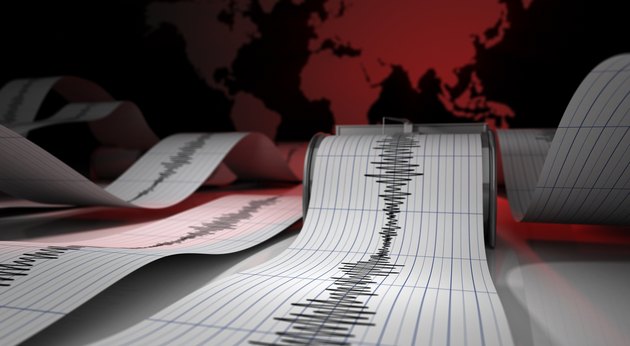https://www.cuteness.com/13725128/can-cats-dogs-predict-earthquakes?utm_source=newsletter&utm_medium=email&utm_campaign=113020

There are numerous anecdotes about unusual animal behavior: animals that live with us in our homes, like cats and dogs, and even farm animals like cows, that act strangely in certain circumstances. Say, for instance, an animal seems like it can predict when their owner is coming home, sense when someone has an illness like cancer, or even predict strange weather.
There is anecdotal evidence of cats and dogs that act strangely prior to the earthquakes that happen frequently around the globe. But is there scientific evidence for this strange behavior? If only we could talk to our cats and dogs and find out what they sense. Scientists have tried to get to the bottom of it, and the outcome is mixed.
Geological survey of earthquakes
While it seems like our earth may be stable, there are actually always earthquakes always happening somewhere. In fact, a geological survey by the U.S. Geological Survey suggests that there are approximately 500,000 detectable earthquakes around the world each year. 100,000 of those can be felt, and 100 of them cause damage.

Anecdotal evidence
There is no shortage of anecdotal evidence that animals can predict earthquakes and sometimes other major weather or geological phenomena. But the problem with anecdotal evidence is that while many believe it to be true and there may even be a strong history of the belief, it's difficult to test and prove using the scientific method.
In 1978, the New York Times published an article about a German biochemist named Dr. Helmut Tributsch of the Max Planck Institute in Munich. Tributsch suggested that the animals act strangely because they sense electrically charged particles in the air that are produced by the earth prior to earthquakes.
Tributsch's hypothesis is that this is similar to the electrical charge in the air that accompanies major storms. Tributsch reported that he investigated several examples of unusual animal behavior when the village of Friuli was struck by an earthquake in May 1976. Tributsch said deer gathered together in unusual numbers. Cats left the village and did not return for two days. Mice and rats left their hiding places and ran around. Bird refused to roost. Dogs barked for no reason, and cattle panicked, bellowed and tried to get loose from their barns.
While all of these behaviors may truly have happened in Friuli in 1976, the problem is that these observations are not testable. The circumstances of these observations can't be reproduced, so it can't be verified scientifically.

Scientific evidence
That doesn't mean that science hasn't tried, but the problem is a lack of continuous, long-term observations of animals experiencing earthquakes, with questions that can be answered such as the animals' distance from the earthquake and whether the animal behavior has ever been observed without being in conjunction with an earthquake.
A 2018 paper in the _Bulletin of the Seismological Society of America _studied 729 reports of unusual animal behavior related to 160 earthquakes. These animals spanned all types and sizes, from elephants to silkworms that came from primarily three events: the 2010 Darfield earthquake in New Zealand, the 1984 Nagano-ken Seibu earthquake in Japan, and the 2009 L'Aquila earthquake in Italy.
While there were plenty of observations of unusual animal behavior, the paper concluded that most of the "evidence" consisted of observations and anecdotes that cannot be tested. Many of the observations consist of animals clustering together in unusual ways. These reviewers suggest that animals may be sensing seismic waves generated by foreshocks from a seismic event that is already happening. A second hypothesis is that the animals are sensing other secondary changes such as changes in groundwater or release of gases from the ground which the animals can sense but humans can not.
Studying animals in earthquake zones
One additional complication in studying unusual animal behavior prior to earthquakes is that there is no way to predict when an earthquake of significant magnitude will strike, and it's difficult to continuously monitor animal behavior.
In 2003 a medical doctor in Japan gave a presentation to the Seismological Society of Japan indicating that dog behavior can predict earthquakes, including excessive barking or biting. In the 1990s, the city of Tokyo researched whether catfish behavior could be used to predict earthquakes, but they abandoned the study after calling it inconclusive.
However, when animal behavior is successfully used to predict an earthquake, such as in 1975 in China, this just keeps the conversation going. Back then, observations of unusual animal behavior, in part, encouraged the evacuation of one million people from the city of Haicheng just days before a 7.3-magnitude quake occurred.
The 2011 Japan earthquake
On March 11, 2011, a magnitude-9 earthquake in northeastern Japan, created a devastating tsunami. Afterward, researchers polled pet owners via the internet to gather anecdotes of animals acting strangely prior to the earthquake. More than 1,200 dog owners and 703 cat owners responded, and their addresses were used to determine how far away from the epicenter they were. The results showed that 18.7 percent of dog owners and 16.4 percent of cat owners reported unusual animal behavior, primarily immediately prior to the earthquake (seconds and minutes prior).
People primarily reported restlessness in their dogs and cats, and wanting reassurance by being close to their owners. Dairy farm monitors reported a drop in milk production in the areas closest to the epicenter on the 5th, 6th, 7th, and 8th days of March.

Dogs and earthquakes
A 2012 study by Dr. Stanley Coren suggests that animals could be responding to the underground noises of rocks grinding together. Coren was gathering evidence of dog anxiety related to Seasonal Affective Disorder when he inadvertently gathered evidence the day before a 6.8 earthquake shook the Vancouver, Canada, area.
On February 27, 2001, the day before the quake, Coren's dog owners reported a sharp increase in activity and anxiety. On the day before, 49 percent of the dogs showed a significant increase in anxiety, and 47 percent were considerably more active. This was a sharp increase from the steady day-to-day averages collected to that point, the study showed.
Can dogs hear earthquakes?
Coren refocused his efforts on dogs and what they were hearing, including how such features as their ear shape might affect this. Fourteen of the dogs had impaired hearing, and all but one of these dogs did not show increased activity and anxiety. Dogs with pricked ears showed more of an increase in anxiety and activity than the dogs with floppy ears.
Coren's dog participants with the smallest heads also showed a greater increase in activity and anxiety than the dogs with larger heads, which fits with other scientific evidence that shows that mammals with smaller head sizes have better high frequency hearing.
What's really going on with pets and earthquakes?
Even though scientists say the evidence is shaky, it does seem like dogs, cats and probably other animals can predict earthquakes. There's no consensus on whether animals are hearing the seismic noise, sensing a secondary affect like atmospheric phenomenon that humans cannot, or responding to an earthquake event that is already happening.
If you happen to be a pet owner and you live in an area where there are earthquakes, you may be able to add to science's knowledge of how animals behavior prior to earthquakes. Keep your eyes and your ears open if you sense that something out of the ordinary is happening, and write it down. You may be able to detect a pattern.

No comments:
Post a Comment